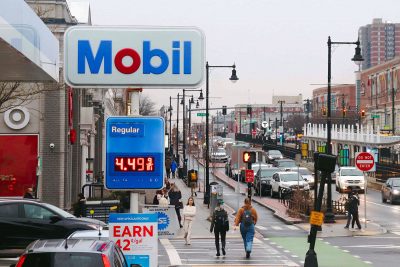
Fueled by accelerating conflict in Ukraine, Massachusetts gas prices have soared in recent days, reaching an average high of $4.36 per gallon on March 11, according to AAA Northeast.
Last week, the Massachusetts House shot down a proposal by Republican lawmakers that would have suspended the state’s 24 cents per gallon gas tax until prices fell below $3.70, according to an AAA press release.
“With gas tax relief not favored by Beacon Hill Democrats, average prices at the pump in Massachusetts rose another 19 cents over the past week and analysts remain unsure how long the trend will continue,” the press release stated.
Mary Maguire, the director of Public and Government Affairs for AAA Northeast, said Boston has seen gas prices rise slightly above the state average — at $4.38 per gallon on March 14 — due, in part, to the Russian invasion of Ukraine.
“So whenever we see geopolitical tension involving a major global oil producers, such as Russia, it has a direct impact on the oil and gasoline markets because it sends jitters and shockwaves through the markets,” Maguire said.
Ryan Chahrour, associate professor of economics at Boston College, said concerns that oil might not be readily available in the future because of the war, along with the fact that it is considered an inelastic good, contributed to the price spike.
“It meant a really big price increase since that war got started,” Chahrour said.
Even before the war in Ukraine, rising inflation — a 40-year high at 7.9% — caused gas and oil prices to surge, according to the U.S. Bureau of Labor Statistics.
Nonetheless, Chahrour added the increase in gas prices has had a larger “psychological effect” on consumers.
“We are in a situation where the economy is booming and consumers are extremely pessimistic, and this is a really unusual situation,” he said. “I think every sign is that this run-up in oil prices is going to make that pessimism even more pronounced.”
Paul Papagni, a Florida resident who had a rental car, said while the sanctions against Russia are “absolutely necessary,” more should be done to help out Americans.
“We’re all rallying behind Ukraine, but where’s our country rallying behind its own citizens?” Papagni said.
Chahrour said the United States should continue to develop its own energy sector and focus on “an energy transition away from oil” in order to mitigate the impact of increased gas prices.
“What we have learned from this experience, and what we have learned in the past, is that it is quite useful to have a robust energy sector within the United States,” Chahrour said.
Maguire said AAA found 56% of drivers are changing their driving behavior, which will lead to a “demand destruction.”
“What happens is that people simply drive less, they consolidate their trips,” she said. “They buy regular gasoline as opposed to mid-grade or premium.”
Maguire added AAA suggests drivers try alternative means of transportation, carpool and run errands on their way back from work instead of making individual trips.
Justin Chen, a junior at Emerson College, said he got his car in October and primarily uses it for running errands and traveling around the city.
“I started taking a lot more public transportation [and] Uber, because of the gas price increase,” he said.
Maguire added consumers should seek out the “cheapest” gas possible.
“I think that for people who live paycheck to paycheck and have a very thin margin, in terms of their budget, they are really suffering right now,” she said. “It’s important for everyone to try to find the best ways to save money.”






















































































































